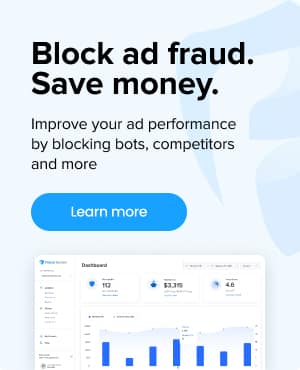What are sponsored ads?
Sponsored ads are a form of online advertising where advertisers pay a fee each time their ad is clicked.
Sponsored ads generally operate on a pay-per-click (PPC) model where advertisers bid on keywords relevant to their business, and these ads appear in search engine results or social media feeds. The bid amount determines the ad’s placement, with higher bids generally securing more prominent positions.
Where to buy sponsored ads?
Advertisers can buy sponsored ads across search engines like Google and Bing, social media platforms such as Facebook, Instagram, and LinkedIn and shopping sites such as Amazon. Sponsored ads can be purchased across the web at individual websites or through ad networks like Google that sell ads across thousands of websites in one place.
Ads are be purchased in a number of different ways including, but not limited to:
- Cost-per-thousand impressions (“CPM”)
- Cost-per-click (“CPC”)
- Cost-per-conversion
- Cost-per-lead (“CPL”)
- Cost-per-call
- Cost-per-sale (“CPS”)
Types of sponsored ads
Each platform you use to purchase sponsored ads offers unique targeting options and ad formats, including text ads, display ads, social media ads, email ads, native ads, video ads and more. Each of these allowing advertisers to tailor their approach based on their marketing objectives and target audience.
Key benefits of sponsored ads
Targeted Audience Reach: Sponsored ads enable precision targeting based on demographics, interests, and search behaviors.
Measurable Results: They provide actionable insights through metrics like click-through rates, impressions, and conversion rates.
Cost-Effectiveness: Advertisers have control over their budgets, with the ability to set maximum bid amounts and daily spending limits.
Brand Visibility: Even if users don’t click, the mere appearance of the ad can increase brand awareness.
How to set up sponsored ads correctly
Sponsored ads offer many advanced options for advertisers that can be challenging to understand for novices so it’s important to follow these steps before launching any campaign:
- Identify Your Audience: Understand who your target audience is and what they are searching for.
- Choose the Right Platform: Select a platform that aligns with your target audience and advertising goals.
- Keyword Research: Conduct thorough research to identify the most effective keywords for your campaign.
- Create Compelling Ad Copy and Visuals: Develop engaging and relevant ad content.
- Set Your Budget: Decide on your bid strategy and set your budget according to your campaign goals.
- Launch and Monitor: Launch your campaign and continuously monitor its performance for optimizations.
Best practices for successful sponsored Ads
Following these steps can help maximize your impact and avoid wasting your ad budget:
- Optimize for Mobile: Ensure your ads and landing pages are mobile-friendly.
- Use A/B Testing: Regularly test different elements of your ads to find what works best.
- Focus on Ad Quality and Relevance: High-quality, relevant ads can lead to lower costs and better ad placements.
- Track and Analyze Data: Use analytics to make data-driven decisions and improve campaign performance.
Examples of effective sponsored ad campaigns
Here are 7 examples of ways businesses can use sponsored ads to promote their business and acquire customers.
Pet Supply Store Targeting Pet Owners on Facebook:
A pet supply store launches a Facebook ad campaign targeting pet owners. The ads showcase their range of pet food, toys, and accessories, with a focus on quality and affordability. By targeting users who follow pet-related pages and have interests in pet care, the campaign effectively drives online sales.
Local Restaurant Targeting Food Enthusiasts:
A local Italian restaurant in New York City uses Google Ads to target food enthusiasts in the area. They bid on keywords like “best Italian restaurant NYC” and create enticing ad copy highlighting their authentic cuisine and cozy ambiance. The ads link to a landing page with menu highlights and reservation options, effectively attracting local diners.
Fitness Center Targeting New Year Resolutions:
A fitness center uses Facebook Ads in early January to target individuals interested in fitness and New Year resolutions. The ads offer a discounted membership for the first month, appealing to those looking to start a fitness journey. Targeting is refined to local residents with interests in health and fitness.
Software Company Using LinkedIn for B2B Marketing:
A software company specializing in business solutions targets other businesses on LinkedIn. Their sponsored ads are crafted to highlight the efficiency and cost-effectiveness of their software, appealing to business owners and decision-makers on the platform.
Real Estate Agent Targeting Homebuyers on Instagram:
A real estate agent uses Instagram sponsored ads to showcase stunning images of new listings. The ads target individuals in specific age groups and income brackets, likely to be in the market for buying a home. The visually rich content of the ads draws attention in the visually-centric Instagram feed.
Tech Gadget Store Using Retargeting Ads:
An online tech gadget store uses retargeting ads on Google’s Display Network to target users who visited their site but did not make a purchase. The ads display products the users viewed, with a special discount code to incentivize a return and complete the purchase.
Local Bookstore Using Facebook Ads for Event Promotion:
A local bookstore uses Facebook Ads to promote an upcoming author signing event. The ad targets book lovers and followers of the author within the local area. The ad’s compelling copy and event details encourage high engagement and turnout.
Related glossary terms:






